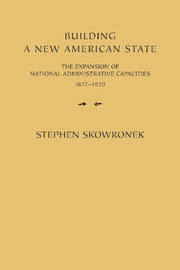Book contents
- Frontmatter
- Contents
- Preface
- Part I The state-building problem in American political development
- Part II State building as patchwork, 1877–1900
- Introduction: The triumph of the state of courts and parties
- 3 Patching civil administration: the limits of reform in the party state
- 4 Patching the army: the limits of provincial virtue
- 5 Patching business regulation: the failure of administered capitalism
- Part III State building as reconstitution, 1900–1920
- Epilogue: Beyond the state of courts and parties – American government in the twentieth century
- Notes
- Selected bibliography
- Index
3 - Patching civil administration: the limits of reform in the party state
Published online by Cambridge University Press: 03 May 2010
- Frontmatter
- Contents
- Preface
- Part I The state-building problem in American political development
- Part II State building as patchwork, 1877–1900
- Introduction: The triumph of the state of courts and parties
- 3 Patching civil administration: the limits of reform in the party state
- 4 Patching the army: the limits of provincial virtue
- 5 Patching business regulation: the failure of administered capitalism
- Part III State building as reconstitution, 1900–1920
- Epilogue: Beyond the state of courts and parties – American government in the twentieth century
- Notes
- Selected bibliography
- Index
Summary
This is a republican government; it is democratic in form, and you will have to change the nature of the Government and change human nature also before you will be able to adopt in practice here any Utopian theories about civil service.
Senator Joseph E. Brown, Congressional Record, December 14, 1882A civil service career system is one of the hallmarks of the modern state. Its chief characteristics are political neutrality, tenure in office, recruitment by criteria of special training or competitive examination, and uniform rules for the control of promotion, discipline, remuneration, and retirement. While offering institutional insulation and job security to the employee, a career civil service promises stability, proficiency, and regularity in public administration.
A comparative survey of institutional development in the late nineteenth century reveals a pattern of concerted efforts to structure administrative careers along these lines. The merit principle of filling administrative vacancies through competitive examinations was instituted in Great Britain in 1870. Canada passed its landmark Civil Service Act in 1882. Japan implemented an examination system for promotions in 1887. A comprehensive career system for Prussian bureaucrats was codified in 1873. The Third Republic in France witnessed continuous, though unsuccessful, attempts at this time for a comprehensive civil service statute to reform the old Napoleonic administrative system.
The American expression of this international trend was the Pendleton Civil Service Act of 1883. Indeed, from the very beginning of the American civil service reform campaign, the cosmopolitan character of the idea was impressed upon those who would adhere to the traditional ways of the spoilsmen.
- Type
- Chapter
- Information
- Building a New American StateThe Expansion of National Administrative Capacities, 1877–1920, pp. 47 - 84Publisher: Cambridge University PressPrint publication year: 1982
- 1
- Cited by



